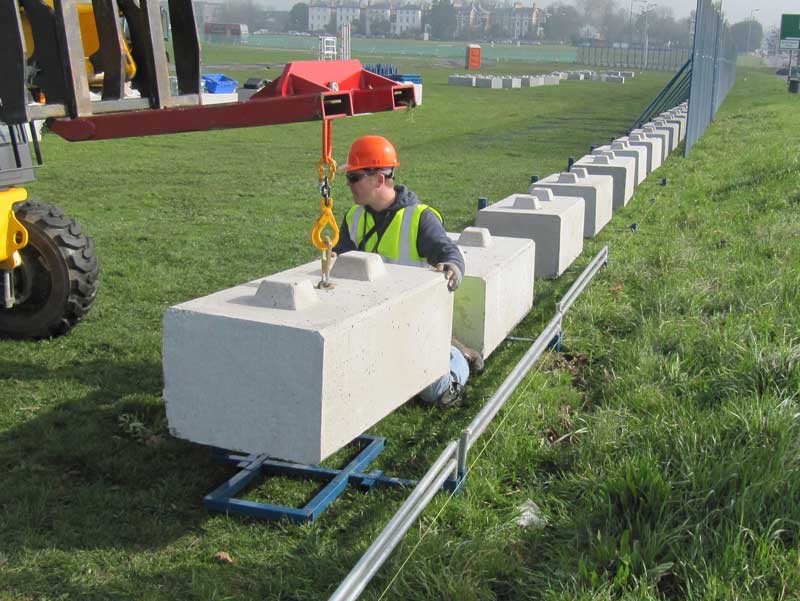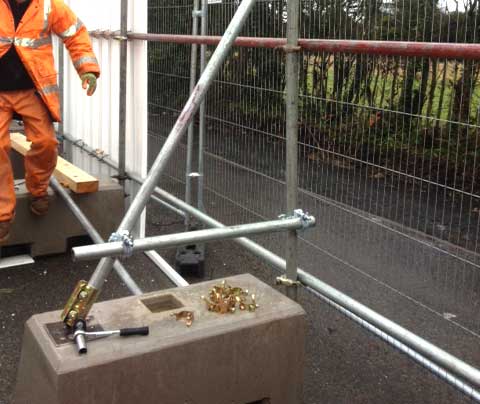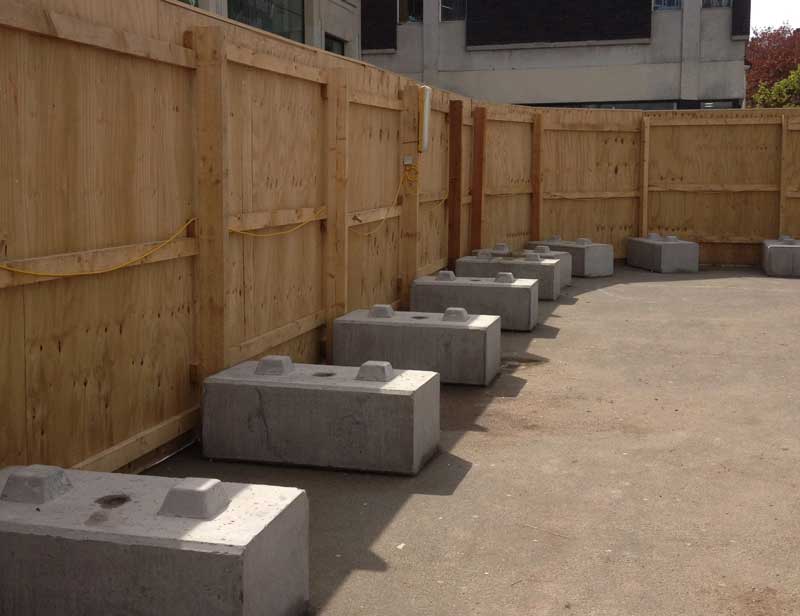In recent years fencing and hoarding contractors have increasingly been using precast concrete blocks as foundations / counterweights / kentledge for temporary and even permanent fencing and hoarding rather than employing the traditional method of digging the posts into the ground.
The advantages of using high quality precast blocks are numerous but can be best summarised as follows –
Easier to budget / estimate / tender
Using precast concrete blocks to support (act as kentledge) the posts means that any uncertainty about the potential costs and difficulties associated with digging holes and using readymix concrete / post mix are eliminated. You don’t have to worry about allowing costs for disturbing buried services / digging into hard / difficult ground. The costs of providing the correct support the posts goes from being a relatively unknown cost which is hard to budget for to a fixed cost.
Low Risk
By not having to dig the posts into the ground any risks of disturbing or damaging buried services is eliminated. As are the risks of being let down by third parties supplying the concrete for the backfill or not being able to dig the holes / backfill with concrete due to adverse weather.
More tidy worksite
By not having to dig the holes / dispose of the spoil / backfill with wet concrete the worksite will always look tidier and more professional.

Insurance saving
As any contractor will know company insurance is one of the biggest overheads. Where risks can be reduced or eliminated insurance costs should in turn be reduced.
Safer during installation
Eliminating the need to break ground by using precast concrete kentledge blocks not only reduces the risk damaging buried services; it also reduces the risk of injuries incurred by heavy hand digging, collisions between labourers and HGV’s (delivering readymix and removing spoil).
Quicker during installation
As positioning, levelling, drilling and fixing posts to free standing kentledge blocks is relatively quick compared to digging holes and backing filling with concrete installation times can be dramatically reduced. In additional using precast blocks to support the posts on uneven ground is much quicker than having to dig holes and position posts at different depths to maintain a level fence.

Safer and more stable after installation
Design engineers can use known data such as wind loadings / seasonality etc which combined with the height and type of fence / hoarding means that exact counterweight requirements can be calculated. Given that precast blocks are available in a variety of weights and given that fixing systems can be specified to withstand know pullout forces, using precast concrete allows a fully designed and engineered solution to be employed.
Given that fencing and hoarding are often required in urban environments its no longer acceptable to trust the integrity and stability of the fence to a hole dug into ground which may be made up of variable material and which is simply backfilled with what is more often than not low strength concrete. Foundations for all above ground structures (including fencing and hoarding) should be correctly designed.
Unfortunately a significant proportion of fencing and hoarding is still installed with little or no thought given to whether or not the foundations are suitable.
Quicker to remove at the end of the project
Dismantling the fencing or hoarding at the end of the project is quick, easy and clean as there is no waste to dispose of or holes to back fill / make good. Its simply a matter of unbolting the posts from the blocks and removing the whole system for use on the next project.

Easier to use in the urban environment
Given that fencing and hoarding are often required in the urban landscape it becomes even more beneficial if the installation can avoid breaking ground. It saves both damaging expensive paving and of course reduced disruption (to pedestrians and road traffic) because its so quick, simple and ‘’clean’’ to install.
More sustainable
No requirement for spoil to be removed from site or for readymix concrete to be delivered to site (or mixed on site) means less waste and a smaller carbon footprint.
Precast concrete blocks can be used for kentledge / counterweights time and time again making them a much more sustainable solution compared to more ‘’traditional’’ in ground methods.
Standard system / better asset management
Contractors who have adopted concrete blocks as their chosen foundation / kentledge system soon find that they are able to better manage their assets – knowing exactly whats needed for every project (it’s the same for every job) means that logistical challenges are easier to manage. The blocks are generally easy to stack when not in use and take up relatively little yard space.
Low cost
Finally, for a number of the reasons outlined above, using precast concrete blocks for above ground kentledge is almost always significantly cheaper that traditional below ground methods. And ultimately this is the factor that will most influence the decision on which foundation method should be used.








